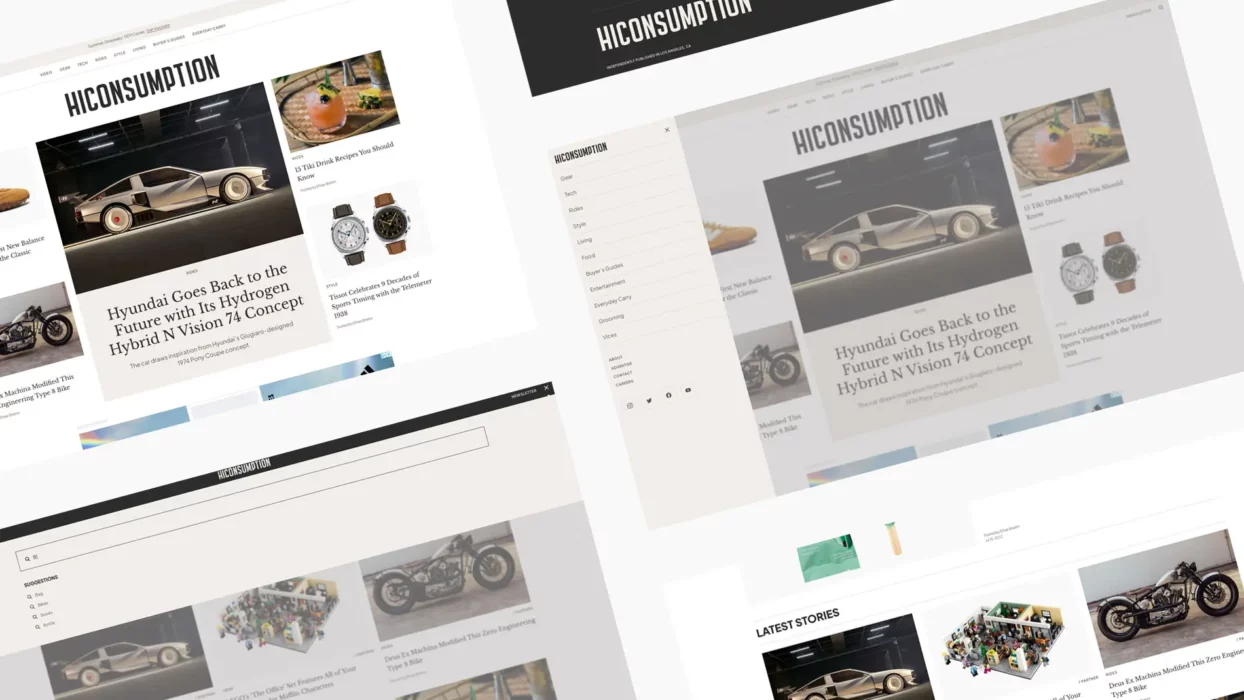Your domain name is more than just a web address—it’s your brand’s first impression, its digital identity, and a powerful marketing tool rolled into one. Think of it as the storefront sign on the busiest street in town. Choose poorly, and even with the slickest WordPress site or Shopify store selling the best product in the world, you’ll be invisible. If your domain was ‘Candy’, as a branded search, the word candy will serve up entries from heavy hitters like Wikipedia first. Choose well, and your business becomes easier to find, trust, and remember.
At Fhoke, a leading London web design agency, we’ve seen how the right domain name can be the difference between a booming business and one that never gets off the ground.
This Article Will Cover:
Why Your Domain Name Matters
With over 2 billion websites live and counting — and almost 600,000 launching daily — it’s safe to say it’s crowded. So, how do you make sure yours doesn’t just join the noise?
It starts with your domain name.
Think of your domain as your business’s home on the internet — your very own slice of online real estate. It’s not just an address; it’s your first impression, your brand identity, and a huge credibility signal, all rolled into one.
At Fhoke, we’ve been building beautiful, conversion-focused WordPress and Shopify websites for brands around the world for over 17 years — and we can tell you first-hand: getting your domain right is the first step to getting everything else right.
So before you take the plunge, let’s walk through everything you need to know to make a smart, strategic choice that sets your website (and business) up for long-term success. Whether you’re a marketing manager at a growing enterprise, a tech-savvy founder, or a small business owner ready to make your mark, this guide will help you secure the right domain name for long-term success.
Let’s dive in.
How to Pick a Domain Name
Choosing your domain name isn’t something to rush through or leave to chance. In a sea of new websites launching every minute, you need something that sticks — something short, sharp, and unmistakably you. Whether you’re a small business making your debut or a marketing team rebranding for growth, the name you choose will shape how customers find you, remember you, and talk about you. It’s more than a web address — it’s your brand’s first handshake.
Too many businesses try to be clever with their domain names and end up being confusing instead. A good domain is easy to spell, pronounce, and share — no dashes, digits, or tongue-twisters required. You wouldn’t want your customers struggling to remember your website or saying, “wait, how do you spell that again?” Trust us, we’ve worked with brands around the world and across all sectors — clarity always wins.
While it might be tempting to squeeze in a pop culture pun or a bit of slang that’s hot today, remember — domains are built to last. You’re investing in something that needs to represent your business today and five years from now. Aim for a name that’s timeless, versatile, and scalable. We’ve seen what works (and what fails fast), and the truth is simple: your domain should grow with your brand, not limit it.
Here’s a quick breakdown:
1. Keep It Short & Sweet
Shorter domain names are easier to remember, faster to type, and look cleaner across everything from business cards to browser tabs. Think about the digital giants — Google, Nike, BBC. They didn’t need long-winded names to make a lasting impression. A punchy, compact domain will help your audience recall your brand with ease and reduce the risk of typos. It doesn’t have to be a real word either — sometimes, made-up names (like ours, which is a play on the word ‘Folk’ btw) with the right energy can work wonders.
2. Easy to Type and Spell
If you have to explain your domain out loud more than once, that’s a problem. Complicated spellings, strange phonetics, or the need to clarify “that’s ‘X’ with a Z and a silent P” is going to cost you traffic. Keep things intuitive. You want your customers to be able to type your domain confidently after hearing it once, without having to double-check it every time.
3. Stay Away from Slang & Pop Culture References
Trendy today, outdated tomorrow. That clever slang term or pop culture nod might feel fresh now, but will it make sense in five years? Worse still, it could alienate audiences who don’t get the reference. The best domain names are timeless. Choose something that will grow with your business, not tie it to a passing fad or niche community that might not be relevant to your future direction.
4. Be Clear & Memorable
Your domain should reflect what you do and be simple to remember. If you’re selling artisan doughnuts, don’t pick a name that sounds like a software company. People are more likely to recommend your website if the name is obvious, relevant, and sticky. Being clever is great — but being clear is better. Make it easy for people to recall your name when they’re telling a friend or typing it into Google.
5. Avoid Numbers & Hyphens
Nothing kills a domain like random digits and hyphens. They’re easy to forget, awkward to communicate verbally, and can look spammy — which is terrible for both brand perception and SEO. Search engines and users alike are wary of domain names that look overly complicated or generic. Keep it clean, simple, and character-free.
Curious about hosting? Read our article: Best Managed WordPress Hosting
6. Make It Pronounceable
If people can say it, they can remember it. That’s the power of processing fluency — the cognitive ease with which our brains digest familiar, pronounceable words. Even if you’re creating a brand-new name, make sure it rolls off the tongue. Think “Spotify” or “Asana.” Hard-to-pronounce names can confuse your audience and make word-of-mouth referrals harder to land.
7. Use Keywords (When It Makes Sense)
Including relevant keywords in your domain name can be a smart SEO move — as long as it doesn’t box you in. For example, “JohnnysJuices.co.uk” might work well today, but if Johnny ever starts selling smoothies or branching into snacks, that domain becomes limiting. Think long-term and don’t let keywords lock you into a niche your business might outgrow.
8. Use Location If It’s Relevant
If your business operates locally, including your location in the domain can be a strong move. A name like “ManchesterPlumbers.co.uk” instantly tells potential customers who you are and where you work. It helps with local SEO, adds trust, and sets expectations. Just make sure you’re committed to that location — expansion plans might require a more flexible name down the line.
9. Go for a Unique, Brandable Name
Your domain is a huge part of your brand identity — it should be distinctive and stand out from the crowd. A unique, made-up or highly specific name gives you a better chance of grabbing the exact match domain, securing social handles, and building a brand that people remember. The more unique it is, the more control you have over how people perceive and search for you.
10. Check the Domain’s History
Just because a domain is available doesn’t mean it’s brand new. Many have been registered before — sometimes used for businesses, blogs, or worse, spam. Use tools like the Wayback Machine or Whois Lookup to uncover any shady past lives. A domain with a bad reputation can harm your SEO, credibility, or worse, associate you with content you don’t want any connection to.
11. Don’t Get Too Close to Competitors
Naming your business something too similar to a competitor isn’t just risky — it’s confusing. While legal action is rare unless you’re actively infringing on a trademark, your customers could easily land on the wrong site, or worse, mistake you for a copycat. Your name should distinguish you, not blend you in. Do your research and avoid sounding like the knockoff version of someone else.
12. Buy It Fast
Good domains don’t hang around. If you’ve found a name you love and it’s available, grab it. Right now. Domain names are snapped up daily, and once it’s gone, it might never come back — or only return with a hefty price tag. Even if you’re still finalising your brand, securing your domain early gives you flexibility and protects your digital presence.
13. Brand & Domain Need to Match
Consistency is key to building a strong brand. If your business is called “ModernFox Interiors” but your domain is “ModernDecorSolutions123.biz,” you’re creating a disconnect. It makes you harder to find, dilutes your identity, and undermines your credibility. Aim for a domain that matches your business name as closely as possible — ideally, an exact match. It’s better for trust, SEO, and customers who want to find you fast.
Still stuck for ideas? Try ChatGPT; it’s pretty solid for picking a name.
Choosing the Right TLD (Top-Level Domain)
There are more than 1,500 top-level domains (TLDs) available today — everything from the classics like .com and .co.uk to niche extensions like .design, .agency, or .pizza (yes, really). But for UK businesses looking to build trust, attract clicks, and scale with confidence, these are the heavy hitters:
.co.uk — Trusted, local, and perfect if you’re focused on the UK
If your business is rooted in the UK and primarily serving UK customers, .co.uk is a no-brainer. It’s instantly recognisable, widely trusted, and signals to your audience that you’re a local business. It’s particularly valuable for industries where regional trust matters — like trades, services, hospitality, or healthcare. Most UK consumers see .co.uk and feel confident clicking, knowing they’re dealing with a company close to home.
.com – Global, Professional, and Iconic
.com is the world’s most popular TLD — and it’s not hard to see why. It’s professional, clean, and universally recognised. If you have international ambitions or already serve clients beyond the UK, .com gives your brand global appeal. Even UK-based businesses benefit from the credibility and familiarity that comes with a .com. Just be aware: great .com domains can be harder (and pricier) to come by due to their popularity.
.uk – Sleek and Modern, But Less Common
Shorter and more streamlined than .co.uk, the .uk extension is gaining traction — but it’s still not as widely adopted. It’s managed by the same UK registry (Nominet), so you’re still getting a solid local domain, just with a more modern, minimal twist. It can work well if you’re after a clean brand identity and your audience is comfortable with newer conventions. That said, some users still instinctively type .co.uk, so if memorability is crucial, consider registering both to cover your bases.
And the Rest? Proceed with Caution.
Niche or gimmicky domains like .guru, .ninja, or .biz can be tempting — especially if your dream domain name is already taken. But while they might look fun, they often come with drawbacks. Many people don’t trust unfamiliar extensions, and some browsers or email clients still treat them with suspicion. Unless your extension directly ties into your industry (e.g. .store for eCommerce or .design for creatives), stick to a classic TLD that strengthens trust and credibility.
A recent survey showed that 70% of users trust .com or .co.uk domains over any other — so when in doubt, go with what people know. First impressions matter, and your TLD can help tip the scale in your favour from the very first click.

How to pick the best Domain Name Provider (Registrar)
With hundreds of registrars competing for your business, knowing what to look for can save you from serious headaches down the line. Whether you’re a solo founder or managing a growing team, these are the main features to consider when choosing the right domain name provider:
What to Check:
- Upfront Pricing (Not Just First Year) – Many domain registrars lure you in with eye-catching prices — some as low as 99p for the first year. Sounds great, right? But those low prices can come with strings attached. Make sure you’re not just looking at the initial price; review the full breakdown of what you’re actually getting. Are there hidden fees? Does that price include basic features like DNS management or email forwarding? Transparency is key.
- Renewal Costs – A domain that costs you £1 today might renew at £15 next year. That’s not uncommon, but it’s important to know before you commit. Always check the standard renewal rate and whether it’s locked in or subject to change. If you’re planning long-term (which you should be), budgeting accurately for renewals is just as important as the first purchase.
- Privacy Protection Options – When you register a domain, your details — name, email, address — are usually listed publicly via the WHOIS database. Reputable providers offer privacy protection (sometimes called WHOIS protection) that hides this information. Some offer it for free, others charge extra. Either way, it’s a must-have to keep your details secure and reduce spam or unsolicited contact.
- Customer Service Access – Things can and do go wrong. And when they do, you’ll want support that’s actually supportive. Look for providers that offer 24/7 customer service with clear, easy ways to get in touch — live chat, phone, email, and ideally a decent help centre or knowledge base. The last thing you want is to be stuck in an endless chatbot loop when your site’s down.
- Easy Domain Management Tools – A good registrar should make it easy for you to manage your domain — whether that’s changing DNS settings, setting up redirects, or linking to your hosting. You shouldn’t need to be a tech wizard to figure it out. A clean, user-friendly dashboard with clear navigation can save you loads of time (and frustration) in the long run.
- Auto-Renewal Setup – Missing a domain renewal can be catastrophic, especially if someone else snatches it up the moment it expires. Look for registrars that offer an easy-to-enable auto-renewal feature or, at the very least, reliable reminder emails. It’s a small setting that gives you major peace of mind.
- Reputation & Reviews – Before committing, it’s worth seeing what others are saying. Check independent reviews and forums to get a sense of real user experiences. Do people report billing issues? Slow support? Surprise charges? Don’t just take the marketing at face value — a strong, positive reputation is a good indicator you’re dealing with a trustworthy registrar.
Popular UK-Friendly Domain Providers (with Comparison Table Below)
With so many domain registrars out there, picking the right one can feel overwhelming — but it doesn’t have to be. Whether you’re looking for rock-bottom pricing, great customer support, or an easy-to-use dashboard, there’s a provider to suit your needs. Here’s a quick overview of the most popular UK-friendly domain providers to help you make the best call for your business:
- GoDaddy – Big name, lots of features, but watch for upsells.
- Namecheap – Budget-friendly and transparent, with free privacy protection.
- 123 Reg – A UK favourite with good local options, but check renewal terms.
- IONOS (1&1) – Great value and reliable support for UK businesses.
- Google Domains – Minimalist, user-friendly, and ad-free.
- Fasthosts – Straightforward UK-based provider, but privacy add-ons may cost extra.
Cost Comparison Table
| Registrar | .co.uk (1st Year) | .com (1st Year) | Renewal (avg.) | WHOIS Privacy | Free Email | Notes |
|---|---|---|---|---|---|---|
| GoDaddy | £1.20 | £1.00 | £11.99 | Paid | No | Watch for upsells |
| Namecheap | £6.80 | £8.50 | £11.00 | Free | No | Transparent pricing |
| 123 Reg | £1.00 | £4.99 | £14.99 | Paid | Yes | Popular in UK |
| IONOS | £0.99 | £0.99 | £10.99 | Paid | Yes | Strong UK support |
| Google Domains | £10.00 | £12.00 | £12.00 | Free | Yes | Clean UX, trustworthy |
| Fasthosts | £0.99 | £2.50 | £14.79 | Paid | No | Reliable, but upsells common |
1. GoDaddy
GoDaddy is one of the biggest names in the domain game — and with good reason. It offers an enormous range of TLDs, aggressive introductory pricing, and 24/7 customer support. That said, it’s known for heavy upselling at checkout and pricier renewals. If you’re confident navigating add-ons and want a well-established provider with lots of extras (like hosting and email), GoDaddy’s a solid contender. Just be sure to read the small print.
2. Namecheap
True to its name, Namecheap is transparent, reliable, and often cheaper over the long term than its rivals. It offers free WHOIS privacy protection as standard, a clean interface, and no hidden nasties when it comes to renewal fees. If you’re after straightforward domain management without the hard sell, Namecheap is a fantastic option for UK businesses who value simplicity and support.
3. 123 Reg
A home-grown favourite, 123 Reg is one of the UK’s most popular domain providers. It’s easy to use, offers UK-specific extensions like .co.uk and .uk, and bundles domain services with web hosting and email. It’s a good starting point for small businesses and entrepreneurs looking to keep things local, although some users report that renewal prices and upsells can sneak up if you’re not careful.
4. IONOS (1&1)
IONOS by 1&1 is a strong choice for UK users wanting robust, no-fuss domain management. Its introductory prices are often among the lowest on the market, and its packages come with extras like email and SSL certificates. Customer support is UK-based and responsive, making IONOS particularly appealing for small businesses and first-time buyers looking for peace of mind.
5. Google Domains
Clean, minimal, and incredibly easy to use, Google Domains is perfect for those who want a stress-free domain experience. There are no sneaky upsells, pricing is transparent, and features like email forwarding and privacy protection are built-in. If you’re already using other Google services or simply want to avoid the fluff, this is a modern, trustworthy choice.
6. Fasthosts
Another UK-based provider, Fasthosts, offers competitive pricing and fast registration for common TLDs. It’s popular among UK SMEs thanks to its familiarity and locally targeted service. However, its checkout process can be a little pushy with extras, and WHOIS privacy often comes at a cost. That said, it’s a reliable, accessible option if you want to keep your domain and hosting under one roof.
Need hosting too? Read our article: Best Managed WordPress Hosting
Securing and Managing Your Domain
As a WordPress and Shopify agency, we’ve had to rescue many clients from expired domains, hijacks, or dodgy setups. Prevention is always better (and cheaper) than cure.
- Enable auto-renewal to avoid losing your domain
- Always register the domain in your name (not your developer’s)
- Set up WHOIS privacy protection
- Use a reputable registrar with security features like 2FA
How Fhoke Can Help
At Fhoke, we’ve spent 17+ years crafting beautiful, functional WordPress and Shopify sites for brands around the world. We know the ropes when it comes to domain strategy, hosting, security, and more.
Need help picking a domain name? Want someone to manage setup, DNS, and hosting too? Starting a new business from scratch?
Get in touch with our London web design team today and let’s make something amazing.
Want more expert advice? Check out other posts in our WordPress blog series.
What Next?
Buying a domain name isn’t just a checkbox on your start-up list. It’s a strategic move. With the right name, the right extension, and the right provider, you’ll set yourself up for a strong digital presence from day one.
No stress, no confusion, no wasted cash. Just solid digital foundations.
And if you want to get this right first time? You know where to find us.



